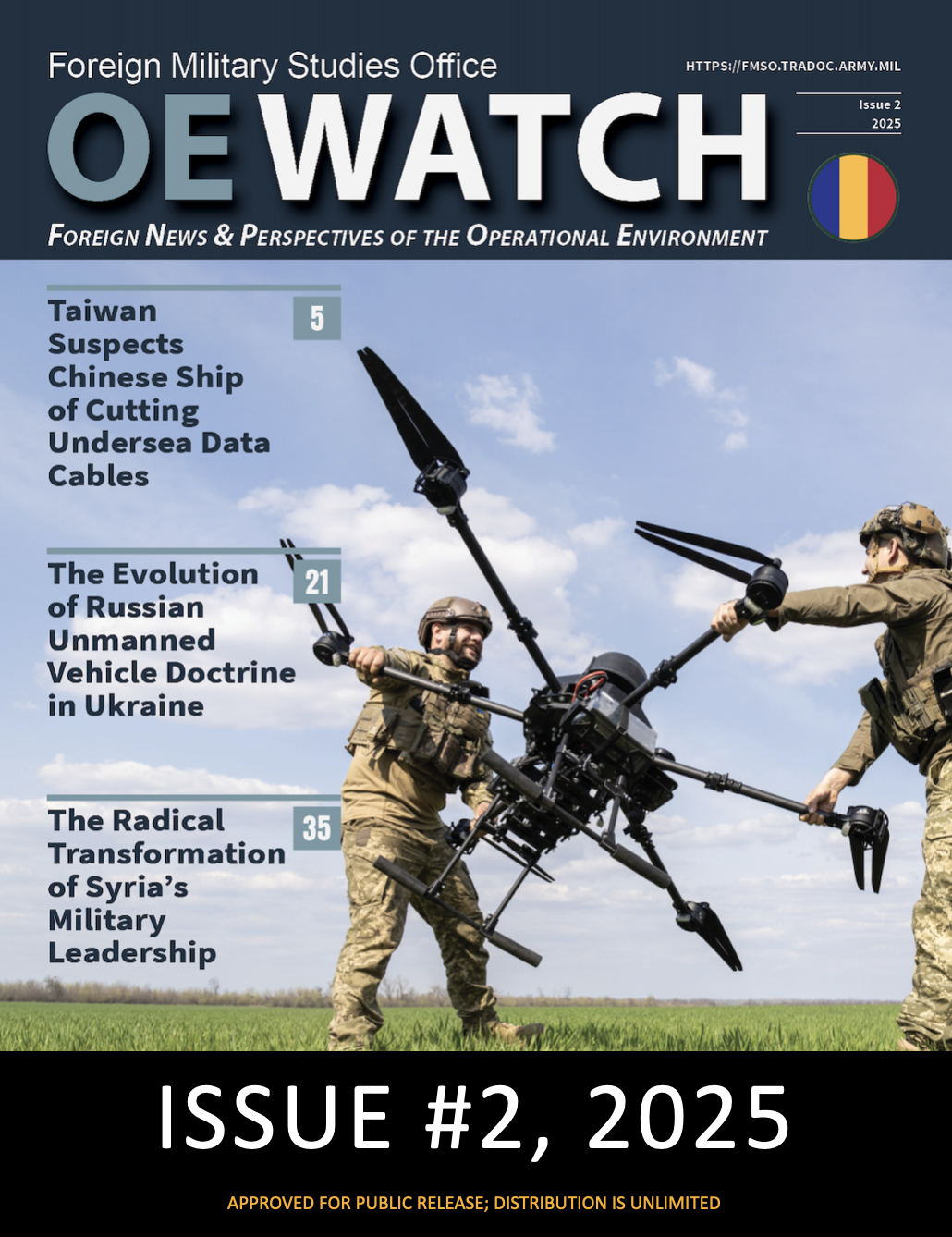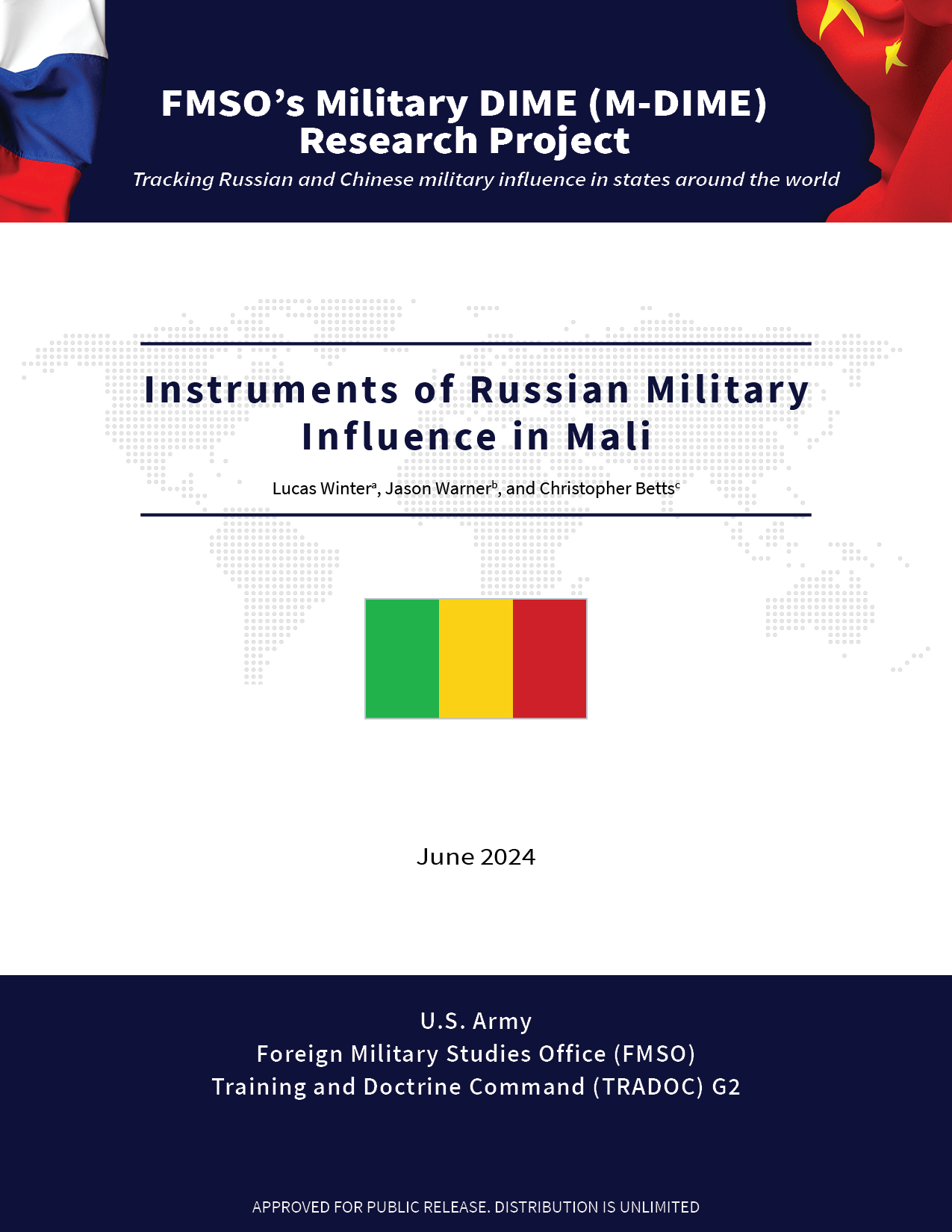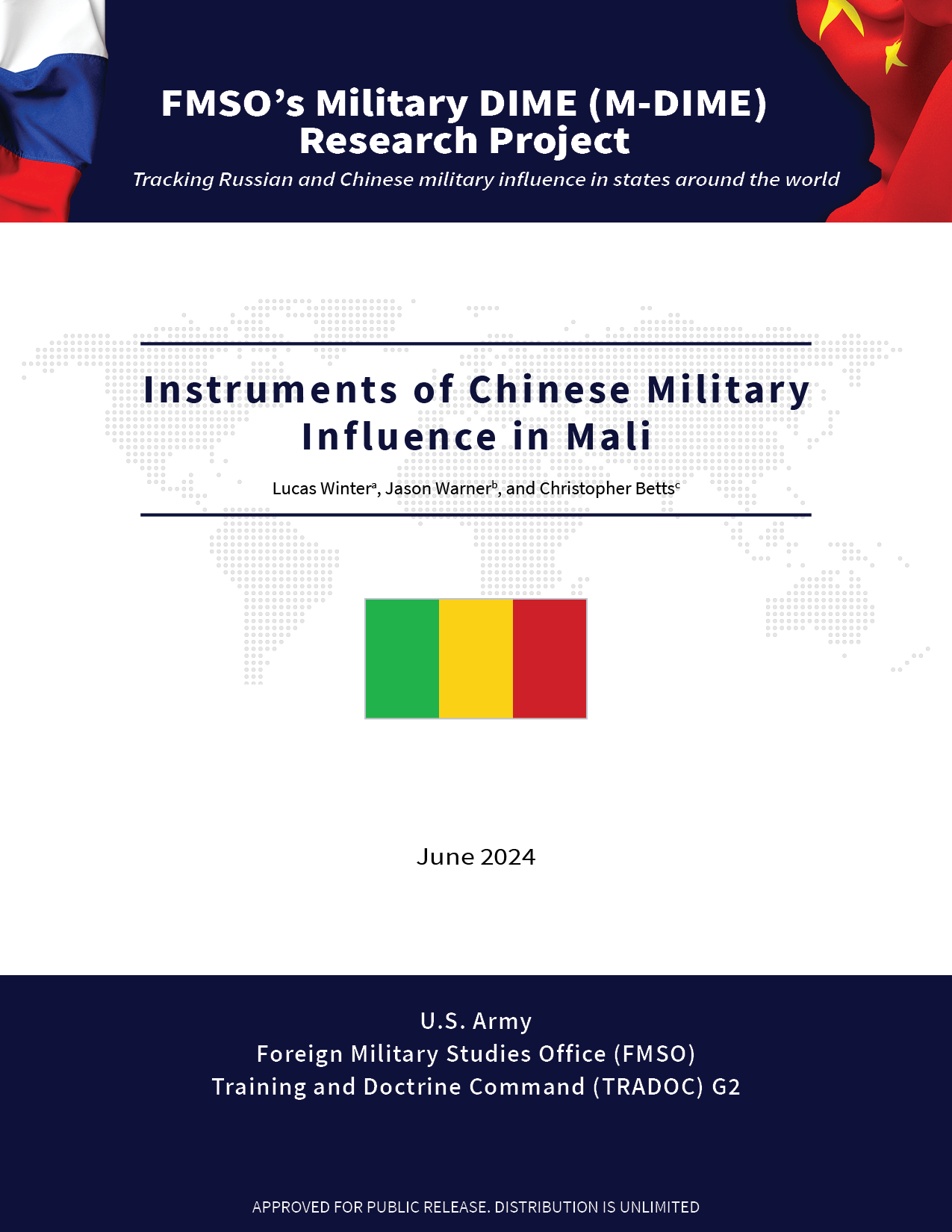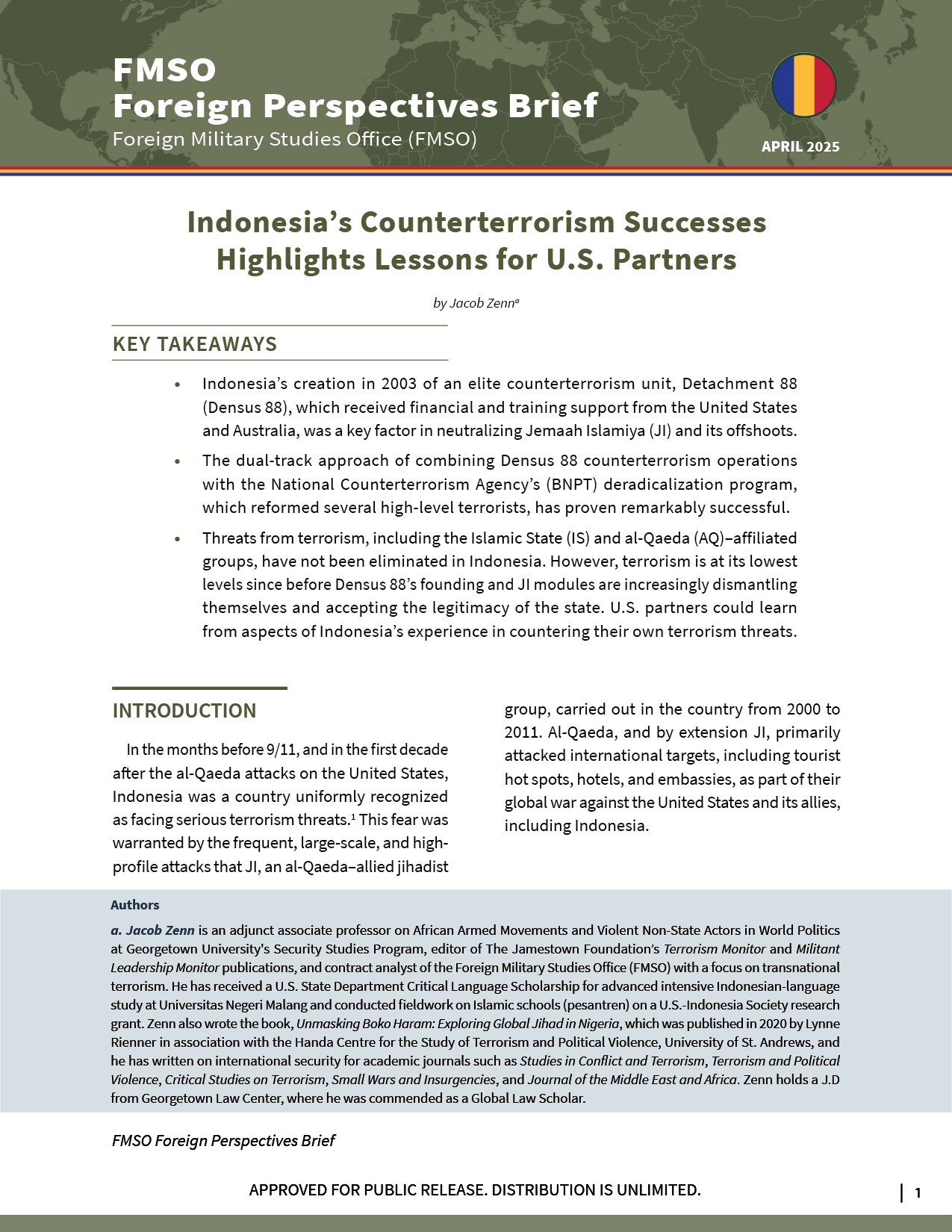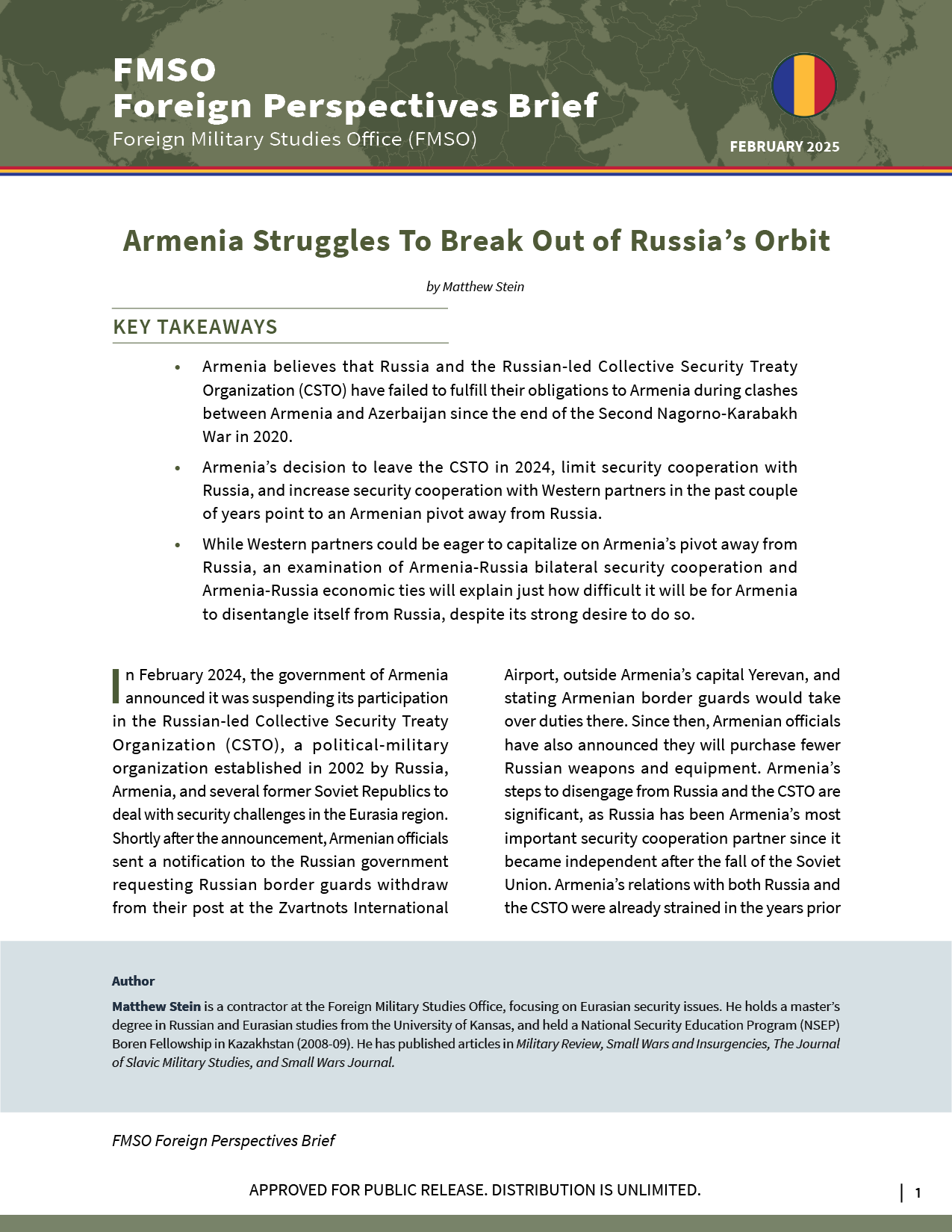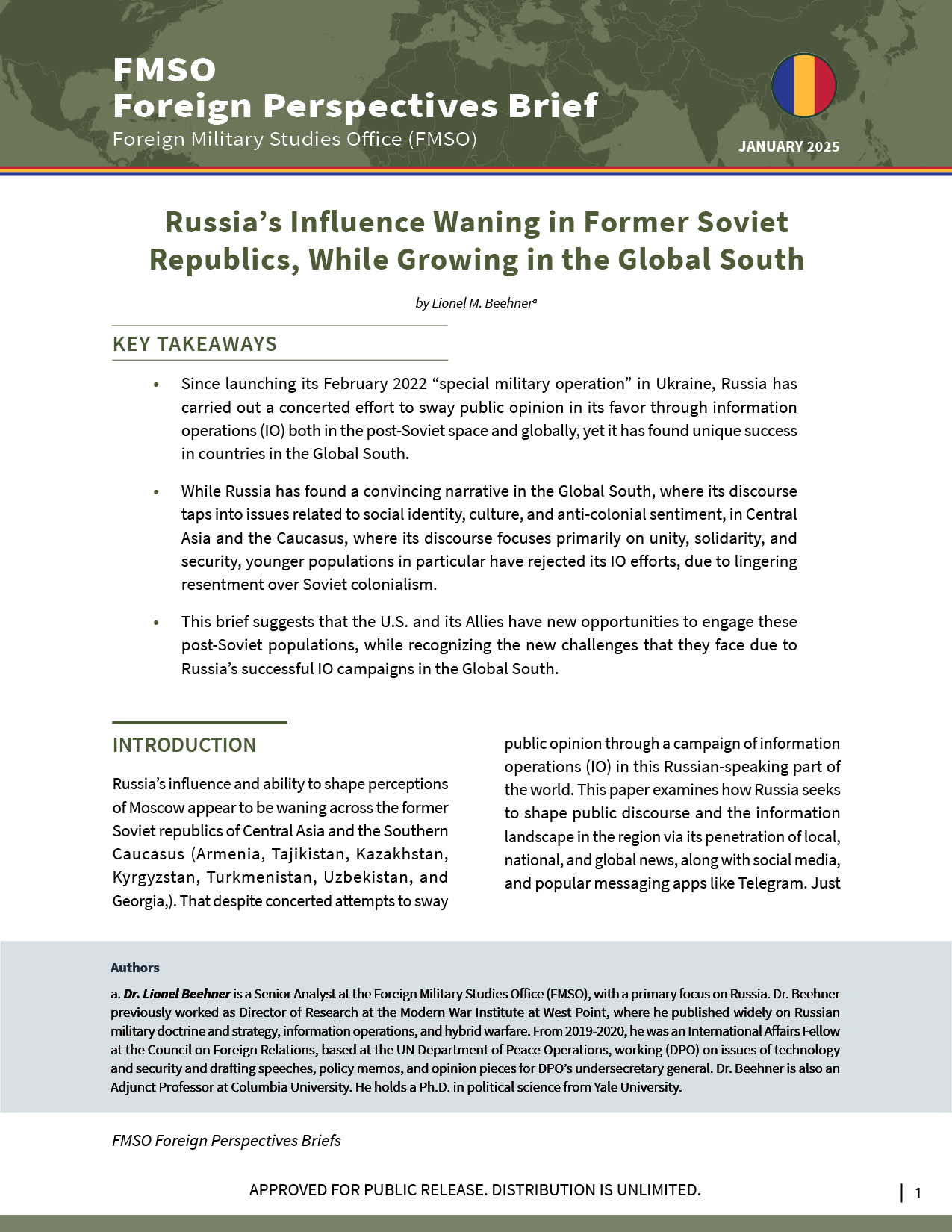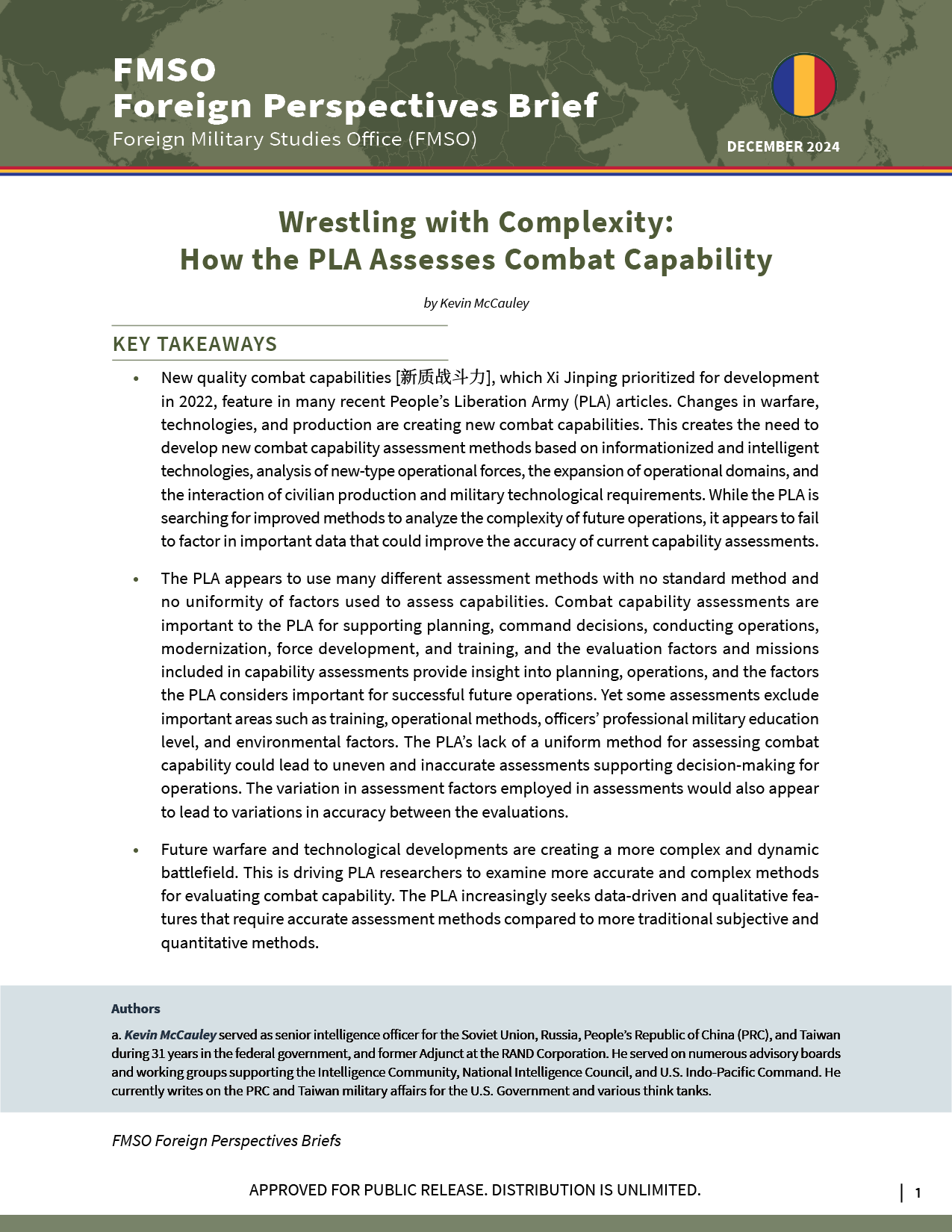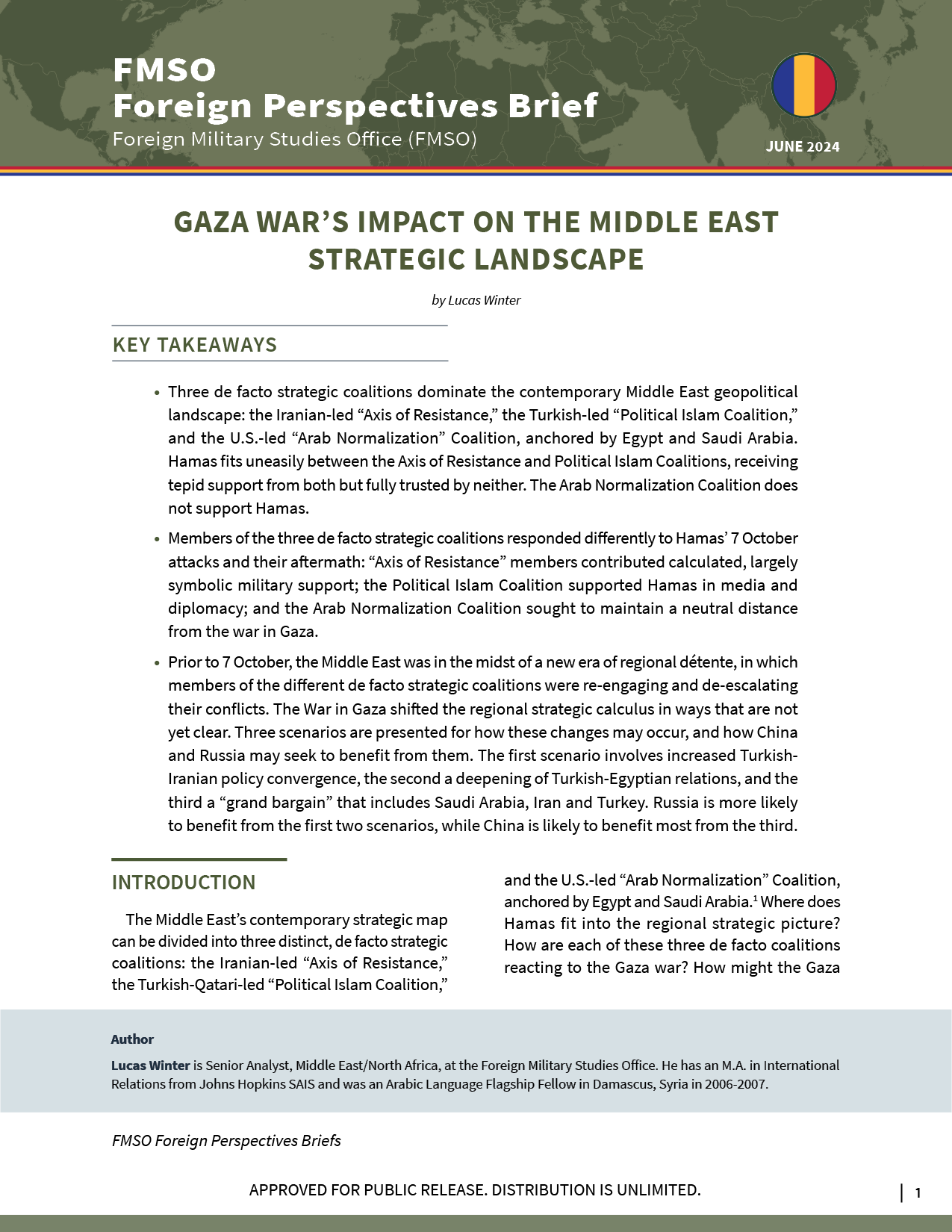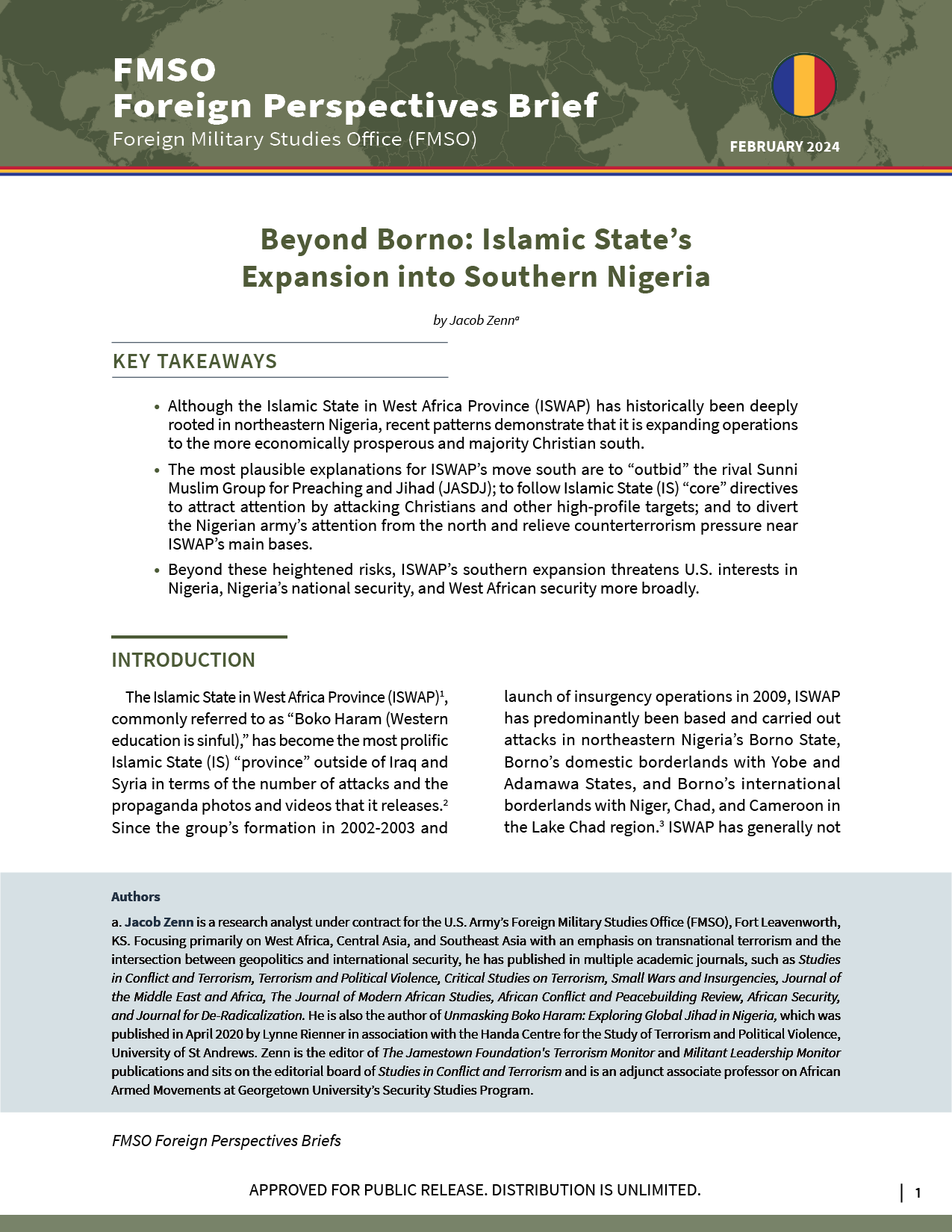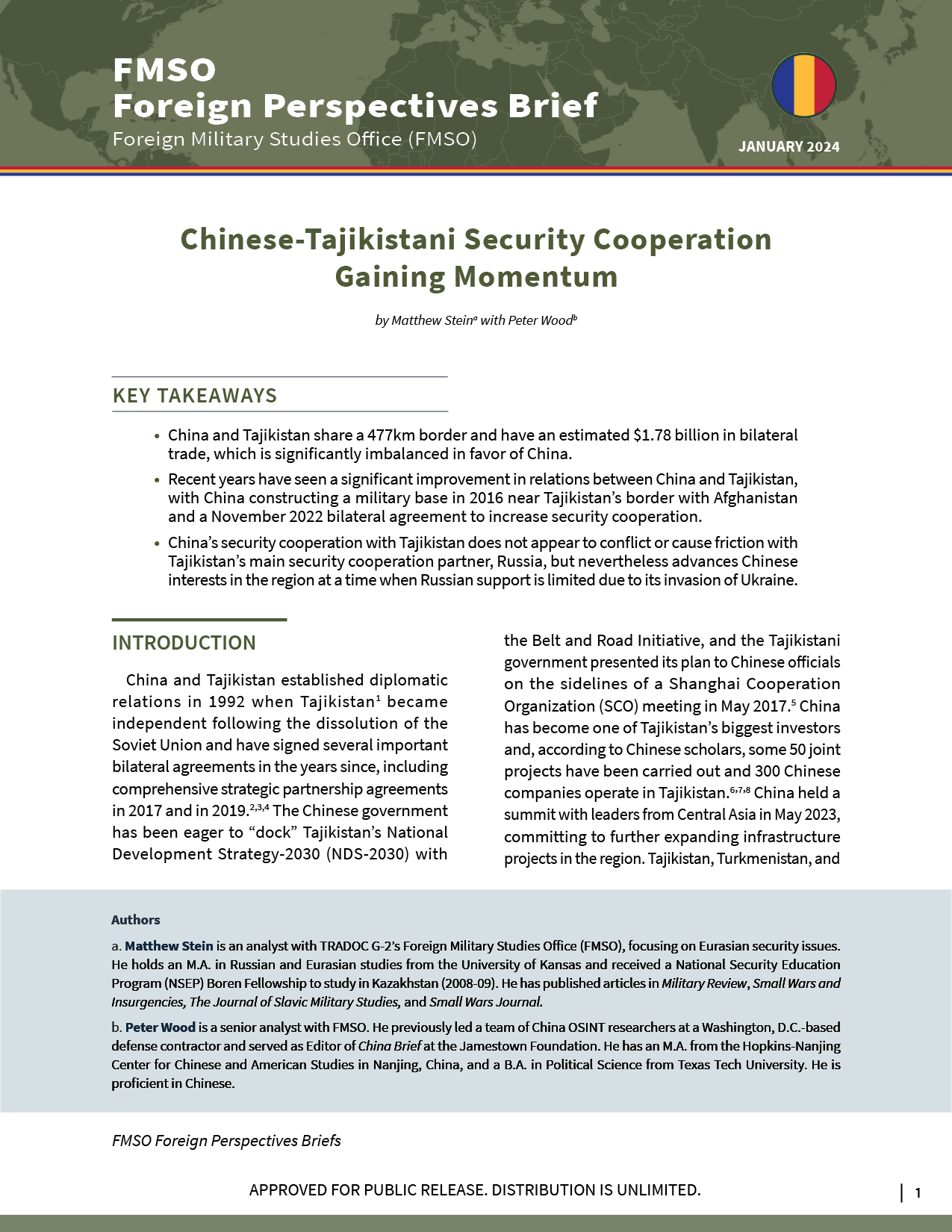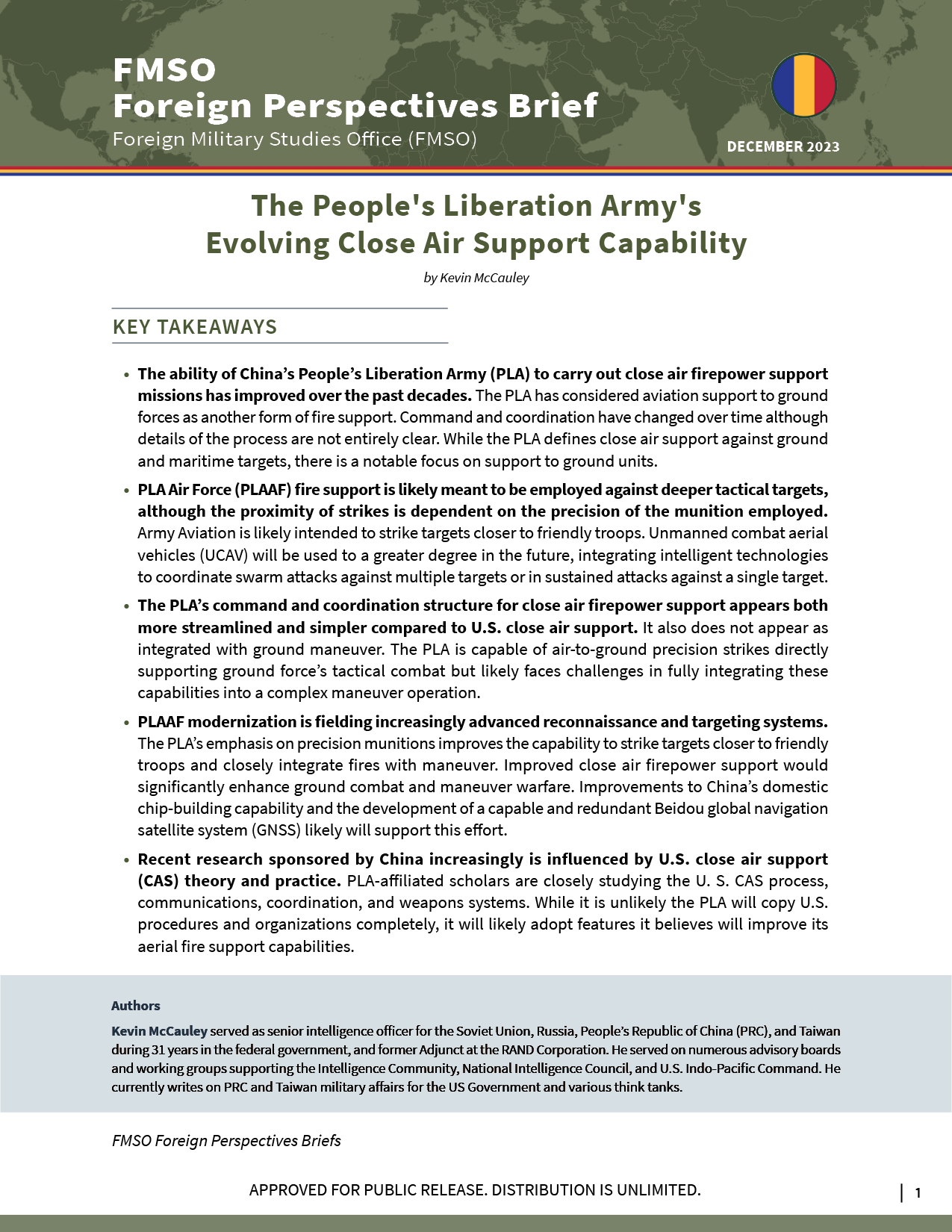OPERATIONAL ENVIRONMENT WATCH
FMSO’s newsletter using local-language media to offer international perspectives of the operational environment.
Colombia Signals Intent To Join China’s Belt and Road Initiative
Despite headwinds in its domestic economy, China’s strategic advance in Latin America continues.[i] In 2023, Chinese foreign direct investment levels in the region remained high at more than $9 billion, which is equivalent to six percent of China’s total foreign direct investment. Continue reading →
Venezuela’s Maduro Completes Election Theft and Installs Himself for Another Term
In early January 2025, President Nicolás Maduro took the oath of office for another six-year term, setting him up to govern Venezuela for longer than his political mentor, Hugo Chávez. Continue reading →
Turkish Defense Industry Celebrates Record Year
The Turkish defense industry is experiencing significant growth and has recently announced a record-breaking year. The accompanying excerpted article from Turkey’s state-run news agency Anadolu Ajansi reports on the Turkish defense industry’s record year of exports in 2024. Continue reading →
The Radical Transformation of Syria’s Military Leadership
After decades of Ba'athist, secular ideology, and Alawite leadership, the Syrian military’s upper echelons are undergoing a radical transformation steered by the one-time Sunni rebels of Hayat Tahrir al-Sham (HTS). Continue reading →
Taliban-Fueled Terrorism in Pakistan Threatens Afghans in Exile
The rise of Taliban-fueled terrorism in Pakistan threatens former U.S. and NATO allies hiding out in Islamabad awaiting relocation to the United States and other western destinations. According to the excerpted news clip from U.S.-funded VOA Dari on its Facebook page, “there are now massive arrests and operations in Islamabad” against Afghans living in the Pakistani capital. Continue reading →
Pakistan’s Counterterrorism Efforts Could Ignite Wider Conflict in the Region
Pakistan continues to be at odds with the Taliban government in Afghanistan for allowing the Pakistani Taliban safe haven to carry out attacks across the border into Pakistan. On 25 December 2024, Pakistan carried out an airstrike in the Paktika Province, Afghanistan, against members of the Tehreek-e-Taliban-e-Pakistan, also known as the Pakistani Taliban, resulting in 46 people killed, including civilians. Continue reading →
North Korean Media Stays Quiet Despite Global Concerns
In the lead-up to the January 2025 inauguration of U.S. President Trump, the Democratic People’s Republic of Korea’s (PRK) media landscape has been rather quiet, focusing instead on domestic political issues and reporting about the news in a matter-of-fact manner, rather than its typically belligerent tone. Continue reading →
Iran Projects Confidence Undeterred by Weakening of Resistance Axis
Despite the severe weakening of the Iran-led Resistance Axis[i] in recent months, Tehran continues to seek to show itself projecting power. Continue reading →
Revolutionary Guard Chief Downplays Departure From Syria
The fall of the Bashar al-Assad regime in Syria is a major blow to Tehran, but Iranian officials are not taking the blame. Continue reading →
Russia Expanding Its Military Influence in Equatorial Guinea
Equatorial Guinea is now a target for Russian military influence and expansion on the African continent, according to the excerpted article from a Russian-language website covering Africa Corps and Russian security affairs, afrinz.ru. Continue reading →
Russia Suspected of Distributing Former Syrian Military Assets To Mali
Officially, Russia has remained silent regarding the whereabouts of its Syrian stockpile of weapons since the fall of the Assad regime. Previous reporting tracked Russian cargo planes loading military equipment, including air defense systems, arrived in Libya shortly after leaving Syria. Continue reading →
Taiwan Suspects Chinese Ship of Cutting Undersea Data Cables
According to the excerpted article from Taiwan-based Taipei Times, on 3 January, an undersea data cable near Taiwan’s Keeling Harbor was cut by “a Chinese freighter,” the Shunxin-39. Continue reading →
The Evolution of Russian Unmanned Vehicle Doctrine in Ukraine
The accompanying excerpted article from the major Russian daily newspaper Izvestia discusses how Russians are adapting to the changing character of war as experienced in its special military operation in Ukraine. Continue reading →
Russia Shrugs Off Stricter Energy Sanctions, Promises Retaliation
After the rollout of new energy sector sanctions in January by the United States and United Kingdom, Russia’s Foreign Ministry responded with a mix of indifference and promises of retaliation for the punitive measure. Continue reading →
Chechen Spetnaz Instructors Training Russian Soldiers in the Arctic Region
The Russian Spetsnaz University in Gudermes, Chechnya, has trained tens of thousands of soldiers from all over the Russian Federation since its establishment in 2013. Continue reading →
China Upgrades Strategic Partnership With Nigeria
On 10 January, the Chinese foreign ministry reported on a meeting between Foreign Minister Wang Yi and Nigerian Foreign Minister Yusuf Tuggar in Abuja. Continue reading →
How China Is Challenging U.S. Maritime Dominance
A recent Chinese report claims the People’s Liberation Army (PLA) is preparing a new electronic warfare (EW) strategy to challenge U.S. maritime dominance. While the report, published by Chinese magazine Defense Industry Conversion, which is supervised by the State Administration of Science, Technology, and Industry for National Defense, is not readily available online, various media sources have written about it. Continue reading →
Maduro Shakes Up Top Security Posts in Venezuela Following Disputed Election
In the aftermath of a deeply contested election, the Maduro regime in Venezuela has undertaken a major reorganization of security positions to consolidate control around the dictator. Continue reading →
Latin America’s Dictators Scramble To Join BRICS
In recent years, the BRICS grouping—Brazil, Russia, India, China, and South Africa—has emerged as a major challenger to the Western-supported international order.[i] Led by major emerging market economies on five continents, BRICS has increased its influence over matters of global financial governance, reform of multilateral institutions, and support of a Global South agenda. Continue reading →
Kazakhstan Expands Opportunities for Volunteers To Join the Armed Forces
Kazakhstan’s armed forces began to draw operational and tactical lessons from the war in Ukraine not long after Russia invaded in February 2022.[i] The accompanying excerpted article from the independent news website Fergana Agency reports that Kazakhstan is again using the example of the war in Ukraine to introduce a new law that allows citizens to volunteer for the military in the event of a war. Continue reading →
Chadian President Threatens Withdrawal From Multinational Joint Task Force
On 28 October 2024, Boko Haram carried out a significant attack against Chadian soldiers in Barakaram on Lake Chad, killing at least 40.[i] Chadian President Mahamat Idris Deby Itno reacted to the Barakaram attack not by requesting greater collaboration with the Multinational Joint Task Force (MNJTF),[ii] which Nigeria has done in response to Boko Haram attacks. Continue reading →
Nigerian Senator Proposes Employment of Private Military Companies Against Boko Haram
Nigeria is a country that has historically shied away from employing private military companies (PMCs) as a matter of national sovereignty. When the country has employed PMCs, including a South African-led contingent[i] that combatted Boko Haram in 2015, it has not yielded success beyond short-term gains. Continue reading →
Arabic-Language Media Divided on Hezbollah’s Future
Hezbollah’s future has become a subject of intense speculation in Arabic-language media following the group’s loss of its top leadership in Israeli strikes earlier this year, including that of Secretary General Hassan Nasrallah in September 2024. Continue reading →
FMSO’S MILITARY DIME (M-DIME) RESEARCH PROJECT
FMSO’s Military DIME (M-DIME) Research Project tracks how China and Russia employ instruments of national power to obtain military influence in Africa, Latin America, the Middle East, and South and Southeast Asia. Within this framework, “military influence” is defined as the ability of a Benefactor country to shape or alter the attitudes, behaviors, and capabilities of actors within—and entities associated with—the armed forces of Recipient countries. The M-DIME framework identifies 12 distinct instruments of national power employed by Benefactor countries to gain military influence in Recipient countries, three for each of the DIME categories.

